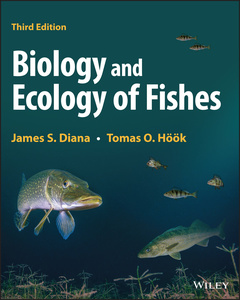Biology and Ecology of Fishes (3rd Ed.)
Auteurs : Diana James S., Höök Tomas O.

Immerse yourself in the world of fish ecology with the newest edition of this essential introduction
The study of fish ecology has traditionally proceeded along two tracks: the first is more basic, concerned with the anatomy, physiology and theoretical ecology of fish, and the second is more practical, concerning itself with fish populations, management, and habitats. Many fish researchers have come to view this distinction as artificial, and to develop a new study of fish that combines both tracks in a single holistic approach. It has never been more critical for introductory textbooks to represent this combined study in order to prepare the next generation of fish biologists and fishery scientists.
Biology and Ecology of Fishes meets this need with a textbook that incorporates both biology and population management. Beginning with a general introduction to aquatic life and ecosystems, this book covers anatomical, environmental, and ethological topics to give a thoroughly rounded view of its subject, promising to serve as the fundamental introduction to multidisciplinary fish studies.
Readers of the third edition of Biology and Ecology of Fishes will also find:
- Detailed coverage of subjects including growth and bioenergetics, feeding and predation, mortality and recruitment and more
- Increased attention to stressors of fish populations and communities
- New and revised chapters that introduce quantitative methods and present emerging issues facing fish populations and communities
Biology and Ecology of Fishes is a useful overview for advanced undergraduate and graduate students studying fish ecology or fishery biology, as well as a reference for researchers and professionals in fish ecology, fish population management, and related fields.
Preface vii
Acknowledgments ix
Part 1 Introduction 1
1 Introduction to Aquatic Ecosystems 3
2 Fish Diversity 14
3 Morphology and Evolution of Fishes 21
Part 2 Bioenergetics and Growth 33
4 Balanced Energy Equation 35
5 Metabolism and Other Energy Uses 42
6 Patterns of Growth and Reproduction 66
7 Estimating Growth and Condition of Fish 86
8 Bioenergetics Models 99
Part 3 Population Processes 115
9 Abundance and Size Structure of Fish Stocks 117
10 Mortality 131
11 Density- Dependence and Independence 142
12 Recruitment 153
13 Social Behavior 169
14 Competition 186
15 Positive Interactions 201
16 Movement and Habitat Use 210
Part 4 Feeding and Predation 229
17 Predation and Foraging Behavior 231
18 Optimal Foraging and Patch Use 246
19 Diet Composition and Ration in Nature 263
20 Predation Risk and Refuges 276
Part 5 Reproduction and Life Histories 295
21 Reproductive Traits 297
22 Reproductive Behavior and Spawning Migrations 306
23 Life- History Patterns and Reproductive Strategies 318
24 Ontogeny and Early Life of Fishes 332
Part 6 Fish Communities in Aquatic Ecosystems 349
25 Description and Measurement of Fish Communities 351
26 Aquatic Food Webs 364
27 Temperature and Fish Distributions 379
28 Fish Communities in Temperate Streams 391
29 Tropical Rivers 407
30 Fish Communities in Lakes 422
31 Marine Ecosystems 439
Part 7 Human Influences on Fish and Fisheries 453
32 Fisheries Harvest 455
33 Invasive Species 476
34 Aquaculture 489
35 Climate Change and Consequences for Fish 503
36 Conservation of Freshwater Fishes 519
Index 533
James S. Diana is Emeritus Professor of Fisheries and Aquaculture and Former Director of the Michigan Sea Grant College Program in the School of Natural Resources and Environment, University of Michigan, Ann Arbor, MI, USA.
Tomas O. Höök is Professor of Fisheries Biology in the Department of Forestry and Natural Resources, Purdue University, West Lafayette, IN, USA, and Director of the Illinois-Indiana Sea Grant College Program.
Date de parution : 07-2023
Ouvrage de 536 p.
21.1x25.7 cm



